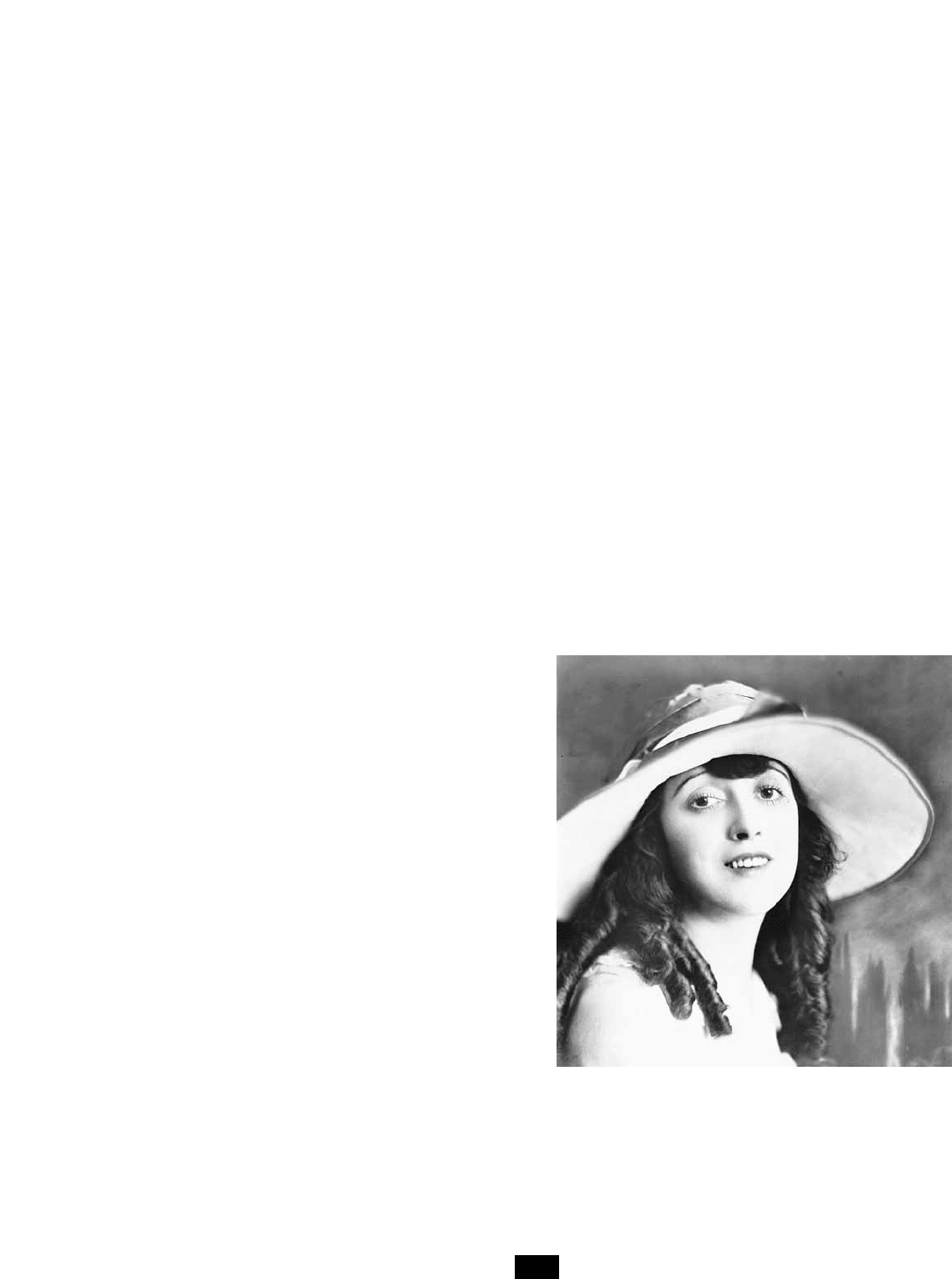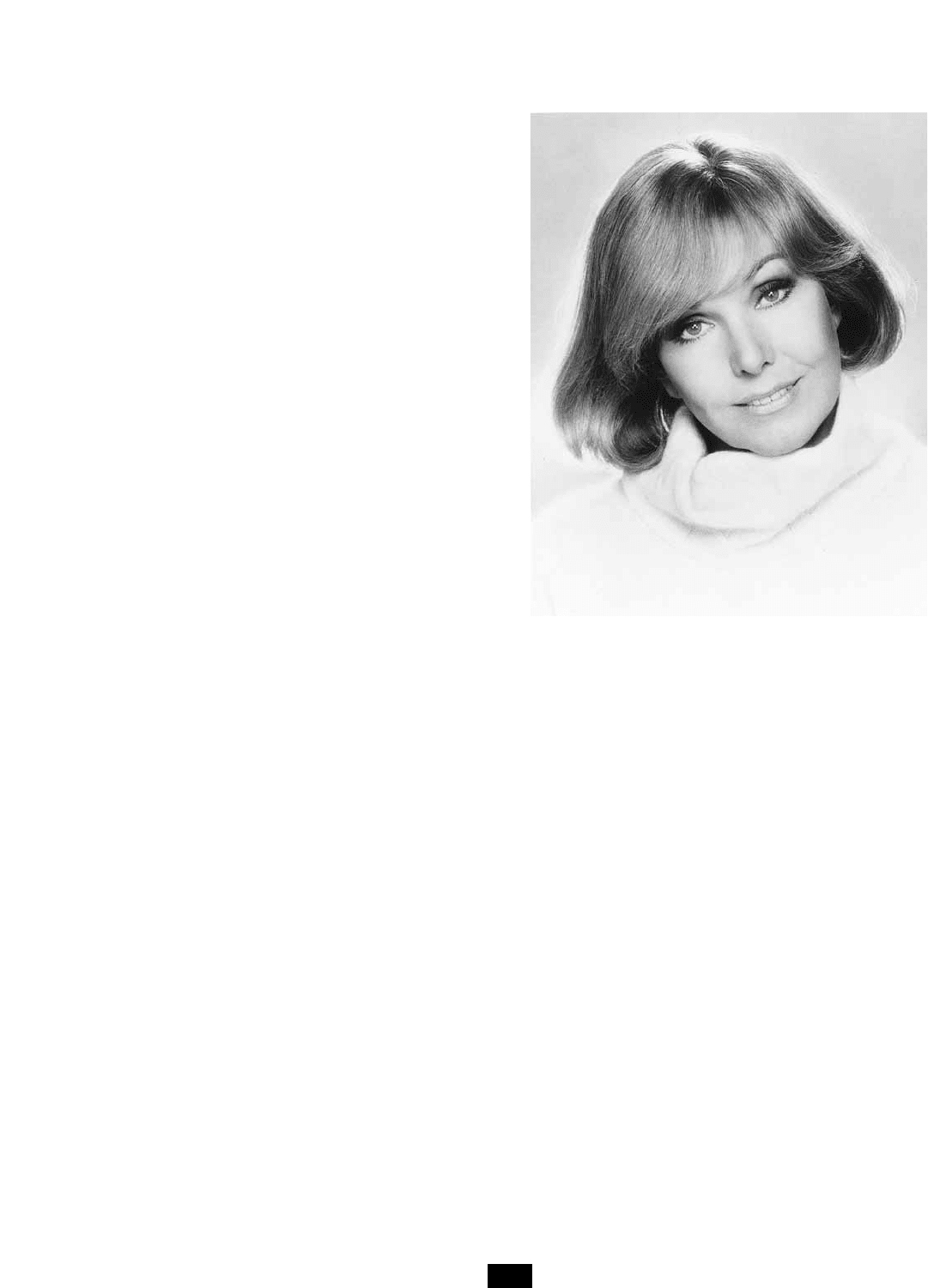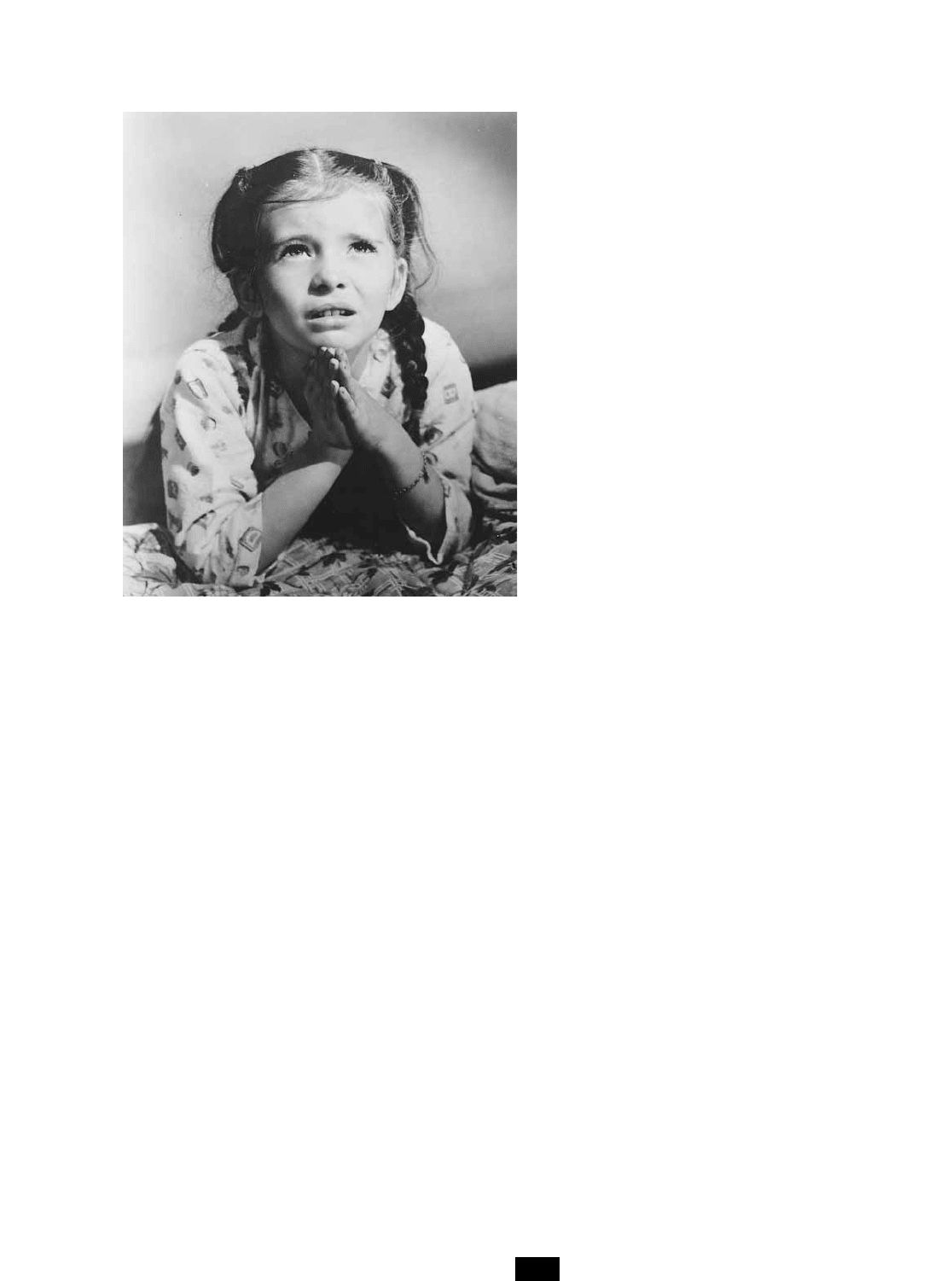Siegel S., Siegel B. The Encyclopedia Of Hollywood
Подождите немного. Документ загружается.


niche as a rebellious outsider, and he has continued to play
variations on that character ever since, including in the film
that finally brought him legitimate star status and his first
nomination as Best Actor, Five Easy Pieces (1970).
Since attaining the clout of a star, Nicholson’s projects
have mostly been intelligently ambitious films that have chal-
lenged his audience. If anything, his commercial failures have
resulted from being too far ahead of their time. Carnal
Knowledge (1971), A Safe Place (1971), The King of Marvin
Gardens (1972), The Last Detail (1973), The Passenger (1975),
and The Border (1982) were all chancy projects, and only Car-
nal Knowledge was a success at the box office, although he did
win an Oscar nomination for The Last Detail. Nicholson has
also directed two films: Drive He Said (1971) and Goin’ South
(1978). He starred in the latter, but both were box-office los-
ers that have since become minor cult favorites.
If Nicholson’s flops were adventurous, so too were his
hits.
ROMAN POLANSKI
’s Chinatown (1974) saved Nicholson’s
flagging career and brought him yet another Oscar nomina-
tion. Then he was brilliantly cast as Randle McMurphy in the
film version of Ken Kesey’s One Flew over the Cuckoo’s Nest
(1975). The film won all five top Oscars, including a Best
Actor Academy Award for Nicholson.
The actor began to appear in smaller roles in interesting
movies during the latter half of the 1970s and early 1980s.
For instance, he sang in a small role in the rock musical
Tommy (1975), played in support of
ROBERT DE NIRO
in The
Last Tycoon (1976),
WARREN BEATTY
in Reds (1981), and
SHIRLEY MACLAINE
in Terms of Endearment (1983). The last
of these performances brought him a Best Supporting Actor
ACADEMY AWARD
.
Nicholson began to choose his starring vehicles even
more carefully during the late 1970s and throughout the
1980s. He was teamed with
MARLON BRANDO
—one of his
early idols—in The Missouri Breaks (1976), worked with one
of the cinema’s leading directors,
STANLEY KUBRICK
, in The
Shining (1980), made a hot-blooded remake of The Postman
Always Rings Twice (1981), and starred with one of the cin-
ema’s most talented female stars,
MERYL STREEP
, in Heart-
burn (1986). Unfortunately, none of these films was terribly
successful commercially although his performances in all of
them were much praised.
Nicholson’s commercial standing rose to meet his critical
reputation during the mid- to late 1980s with his Oscar-nom-
inated performance in the hit Prizzi’s Honor (1985), as well as
his starring role in the successful romp The Witches of East-
wick (1987). Though Ironweed (1987) was not a money-maker,
his Oscar-nominated performance in this prestigious picture
was so strong that it further enhanced his reputation as one
of Hollywood’s most serious and valued actors. Finally, he
topped off the decade with a tour-de-force portrayal of The
Joker in the megahit Batman (1989).
Nicholson is a performer who has not stooped to appear-
ing in half-witted sequels, with one exception: the sequel to
Chinatown, entitled The Two Jakes (1990), which he also
directed from a smart script by Robert Towne.
The Two Jakes was followed by Man Trouble (1992), not the
actor’s best work, perhaps, but it was directed by Bob Rafel-
son, who had helped to elevate Nicholson to star status in Five
Easy Pieces. Two other films would follow that year, Hoffa, with
Nicholson playing the eponymous lead, and, better still, A
Few Good Men, written by Aaron Sorkin, directed by Rob
Reiner, and a winner for Nicholson, who played the crusty
Col. Nathan Jessup in an exemplary courtroom drama that
earned him an Oscar nomination for Best Supporting Actor.
In 1994, Nicholson signed on for Wolf, which failed to
elevate the werewolf genre to high art, and The Crossing
Guard, directed by
SEAN PENN
. Mars Attacks! (1996) was an
extravagant Tim Burton film that cast Nicholson as a
moronic American president. When he returned to Bob
Rafelson for the seventh time to make Blood and Wine (1996),
he shared star billing with Michael Caine.
Things were better for Nicholson the next year with As
Good As It Gets (1997), in which Nicholson starred as a mis-
fit, homophobic novelist who finds redemption in the arms
of Helen Hunt. This role brought him the Best Actor Acad-
emy Award and a Golden Globe to boot. However, even
greater roles were to come. In 2001 Nicholson played the
lead in The Pledge, expertly directed by Sean Penn. It was
described by one critic as representing “the end of the detec-
tive novel.” In About Schmidt (2002) Nicholson is a dumpy,
retired insurance executive who must deal with his frumpy
wife’s death and his daughter’s impending marriage to a man
whom he sees as a loser. Traveling in his Winnebago, and
corresponding with a Third World orphan, he comes to
terms with himself and learns to accept what he cannot
change. Nicholson earned another Oscar nomination.
Responding to Nicholson’s performance in About Schmidt,
New Republic critic Stanley Kauffmann wrote that this pic-
ture “verifies again what has long been clear. Any future his-
tory of American films must, if it is to be adequate, treat
Nicholson as more than a star.”
The Jack Nicholson–Adam Sandler picture Anger Man-
agement (2003) grossed more than $42 million on its opening
weekend, proving Nicholson’s continuing box-office power.
Nicholson, playing psychological counselor Dr. Buddy
Rydell, makes Adam Sandler look sane in comparison to his
manic antics.
nickelodeon The humorous name given to makeshift
movie theaters built in converted storefronts during the early
1900s that charged an admission price of a mere nickel.
According to Green and Laurie in their book, From Vaude to
Video, “In 1904 not a single nickelodeon sullied the land. But
three years later, over 2,000,000 people a day . . . were jam-
ming into movie shows.”
Nickelodeons were known as the poor man’s amusement,
and at a nickel per show, the movies were soon killing off
vaudeville. Geared for low-cost, no-frills entertainment,
nickelodeons prospered because they were small, seating less
than 300 patrons, the magic number at which most theaters
had to be licensed. This allowed them to avoid city bureau-
cracies and the consequent cost of bribing local officials.
The lifespan of the nickelodeon era was very short: little
more than 10 years. As the new star system made millionaires
NICKELODEON
298

out of actors and as films became longer and more expensive
to produce, it became inefficient for film companies to make
costly prints of each film to rent to thousands upon thou-
sands of such small “theaters.” The only way the producers
could turn a profit was to sell their movies to fewer but big-
ger houses that could, in turn, show the films to larger audi-
ences at a higher price.
As Green and Laurie report, the beginning of the end of
the nickelodeon era came with the building of the Strand
Theater in New York City in 1914. The first movie palace sat
3,300 people. The top admission price was 25 cents. Not
long after, when safety laws were tightened all across the
country concerning buildings that housed public entertain-
ment, the nickelodeon could no longer survive.
A perceptive handful of men who owned nickelodeons
and could see the bright future of the movies went on to
become powerful moguls in Hollywood. Some of the early
owners of such establishments were
WARNER BROS
.,
LOUIS B
.
MAYER
, and
ADOLPH ZUKOR
.
In more modern times,
PETER BOGDANOVICH
made a
charming movie, Nickelodeon (1976), that captured some of
the energy and excitement of the early film business, when
movies could be seen for just five cents.
Niven, David (1909–1983) An urbane Scottish actor
who specialized in playing light comedic and romantic leads
in both Hollywood and England for more than 45 years.
Niven wasn’t a formally trained actor as were so many of his
British colleagues, but he imparted a dashing enthusiasm to
his roles that sufficed until he finally learned the tricks of the
trade. Niven was not a terribly handsome man, but he did
have charm and a soothing upper-class accent that made him
seem all the more sophisticated to American audiences.
He was born James David Graham Niven to a military
family. He attended Sandhurst Military Academy, England’s
equivalent of West Point, and went on to serve in the High-
land Light Infantry. Restless and adventurous, Niven left the
“family business” of soldiering and began an around-the-
world odyssey, working as a reporter, a mercenary, a bar-
tender, and a host of other jobs, whenever he needed money.
When he finally landed in Hollywood in 1934, Niven
thought he’d pick up some pocket money working as an
extra, and soon enough he could be glimpsed in such films as
Mutiny on the Bounty (1935), Barbary Coast (1935), and Splen-
dor (1935). His affair with actress
MERLE OBERON
brought
him into the right circle of powerful Hollywood producers
and directors, and he soon began to move up the cast list,
making his breakthrough as Major Clyde Locket in
Dodsworth (1936). He also gave winning supporting perform-
ances in the latter half of the 1930s in such action/adventure
films as The Charge of the Light Brigade (1936), The Prisoner of
Zenda (1937), and The Dawn Patrol (1938).
Holding his own against
LAURENCE OLIVIER
in Wuther-
ing Heights (1939) and playing comedy in Bachelor Mother
(1939), Niven was fast becoming a major star. But when war
broke out in Europe, and England joined the fray, Niven
quickly finished making Raffles (1940) and hurried back to
Britain to join the war effort as a lieutenant in the Comman-
dos (he was a colonel by war’s end).
With the war over, Niven returned to acting and made
one of his best films, the English production of Stairway to
Heaven (1946). It was a hit in America as well. Niven traveled
back and forth between the two countries during the rest of
his career. On the whole, he did not make a great many fine
or memorable films, but he was always much in demand. His
English films were particularly bland, the best of them being
Court Martial (1955), Bonjour Tristesse (1958), and Prudence
and the Pill (1968). He also made the James Bond spoof Casino
Royale (1967) in England; it’s worth noting that the suave
Niven was Ian Fleming’s first choice to play 007.
Niven’s American films were variable. He had some early
success after the war with films such as The Bishop’s Wife
(1947) and Enchantment (1948), but his career took a dip in
the early 1950s. During that time he turned to television,
joining with
DICK POWELL
and others in the formation of
Four Star Productions, a successful venture that later led to
his starring in episodes of the TV shows Four Star Playhouse
and The David Niven Show.
By the mid-1950s, rather late in his career, Niven sud-
denly found himself with a burst of major movie hits that
brought him to a new level of stardom. The big break-
through was his playing of Phileas Fogg in the international
blockbuster, Around the World in 80 Days (1956). He went on
to win his one and only Best Actor
ACADEMY AWARD
with his
intelligent and subdued performance in Separate Tables
(1958). He had the last of his major hits with Please Don’t Eat
the Daisies (1960) and The Guns of Navarone (1961).
Niven had his moments during the rest of the 1960s, but
his star was definitely fading. In the early 1970s he published
his engaging memoirs The Moon’s a Balloon (1971) and its
sequel, Bring on the Empty Horses (1975), both of them best-
sellers that brought him a new wave of celebrity.
Opportunities to act were still available to him, but the
roles were seldom good. He seemed in his element in the all-
star film Death on the Nile (1978), but he was sadly out of place
in films such as Old Dracula (1974), Better Late Than Never
(1982), and Curse of the Pink Panther (1983), which was his last
movie. He died before the final dialogue had been looped, and
his voice was dubbed by impressionist Rich Little.
Nolte, Nick (1941– ) Although he was 36 when he
finally got a breakthrough role, Nick Nolte went on to
become one of the most popular and gifted of Hollywood’s
leading men. Combining physical toughness with a vulnera-
ble sensitivity, he usually portrays a macho character who is
undone by his own feelings and who is at odds with society.
A high school football star who won athletic scholarships
to Arizona State University, among others, Nolte cut his aca-
demic career short by being expelled for poor grades at more
than one institution of higher learning. When he was 21 years
old, he was convicted and sentenced to 45 years in jail for
selling fake draft cards, but the sentence was suspended. After
his poor academic career, he moved to California. He studied
acting at the Pasadena Playhouse and then at Stella Adler’s
NOLTE, NICK
299

Academy in Los Angeles, where his mentor was Bryan
O’Byrne. For 14 years, he worked in regional theater, television
films (Death Sentence, 1974), and such “B” movies as Return to
Macon County (1975). When he was cast as Tom Jordache in
Rich Man, Poor Man, a television miniseries, he received an
Emmy nomination for his performance, his first big break.
This led to his costarring role with Jacqueline Bisset in
The Deep (1977), which was followed by New York Film Crit-
ics Circle nominations for Best Actor in Who’ll Stop the Rain?
(1978), as a disillusioned Vietnam War vet, and North Dallas
Forty (1979), playing a disillusioned wide receiver modeled
after Pete Gent, the author of the book on which the film was
based. Though Heart Beat (1980) was a box-office disap-
pointment, Nolte was effective as Neal Cassady, Jack Ker-
ouac’s friend. He was much more successful in his first
“buddy” film, 48 Hrs. (1982), which paired him with
EDDIE
MURPHY
in a cop drama rife with Murphy humor. Essen-
tially, it was an “odd couple” (ebullient, irrepressible Murphy
and dour, world-weary Nolte) film so successful that the two
would reprise their roles eight years later in Another 48 Hrs.
In the eight years between the two films with Murphy,
Nolte appeared in several films, most of them undistin-
guished, and it was also during this period that he had some
problems with alcohol. For every Weeds (1987), there were
two or three Grace Quigleys (1984). In 1991 in The Prince of
Tides, he was the brother of
BARBRA STREISAND
’s patient, still
traumatized by being raped at 13. For his performance, he
won a Golden Globe for Best Actor in a Drama and was
nominated for Best Actor awards by the academy and by the
New York Film Critics Circle. Since then, he has had a string
of successful film roles and garnered critical praise.
Assuming the role that
GREGORY PECK
had played in the
original Cape Fear (1961), Nolte held his own against the
threatening
ROBERT DE NIRO
in the remake (1991). In Lorenzo’s
Oil (1992) he and
SUSAN SARANDON
(who earned an Academy
Best Actress nomination for her performance) were cast as the
parents of a child with ALD (adrenoleukodystrophy), and in
the Merchant–Ivory Jefferson in Paris (1994), he had the title
role in a film that explored the alleged sexual relationship
between Jefferson and his slave Sally Hemings. Blue Chips
(1994) provided Nolte with a different kind of role. As coach
Pete Bell (a Bobby Knight type), he was an idealist whose code
was compromised by the pressures of university alumni.
Nolte’s next important role was as Sheriff Wade White-
house in Affliction (1997); he was also the executive producer
of that film. As the small-town sheriff intent on doing the
right thing but usually failing, Nolte was again playing the
flawed idealist frustrated and defeated by his own feelings
and failings. He was also again nominated for a Best Actor
Oscar. The following year, he was one of the many stars in
the epic war film The Thin Red Line and also appeared in
Nightwatch. Other important roles were in the film adapta-
tion of Henry James’s The Golden Bowl (2001); The Hulk
(2003), in which he played the father of the comic-book hero;
and The Good Thief (2003), in which he was an aging gangster
and gambler plotting a casino heist, with predictable results.
Nick Nolte has slogged his way across the existential ter-
rain of many a movie, toughing out the drug complications of
Who’ll Stop the Rain, for example. Lee Tamahori, who
directed him in Mulholland Falls (1995), described Nolte as
“one of the finest actors in American cinema.”
Normand, Mabel (1894–1930) She was the only female
star equal in popularity as well as talent to such silent-screen-
comedy giants as Chaplin, Keaton, Lloyd, and Arbuckle.
Often working both ends of the camera as an actress-direc-
tor, the pretty and lithesome Normand had considerable
impact on early film comedy. Her career, however, was cut
short by scandal and ill health.
Normand was introduced to show business by her father,
who was a piano player on the vaudeville circuit. At the age
of 16, she landed a job at the Biograph company. The studio
was enjoying a renaissance under the stewardship of
D
.
W
.
GRIFFITH
, but it was the director
MACK SENNETT
who took
Normand under his wing.
Normand’s first leading role was in The Diving Girl
(1911). She became a star quickly thereafter, her name often
included in her one-reel comedy titles, such as Mabel’s Adven-
tures (1911), Mabel’s Strategem (1911), Mabel’s Heroes (1912),
and Mabel’s Awful Mistake (1912).
When Sennett left Biograph to establish his Keystone
Studio in 1912, Normand followed. She became one of his
biggest stars, leading casts that included
CHARLIE CHAPLIN
,
NORMAND, MABEL
300
Mabel Normand was the leading comedienne of the silent
era and a staple of Mack Sennett’s Keystone stock company.
Athletic, adventurous, and yet supremely feminine, she was
enormously popular until she became a suspect in the 1922
murder of director William Desmond Taylor.
(PHOTO
COURTESY OF THE SIEGEL COLLECTION)

Ford Sterling, and
FATTY ARBUCKLE
. She directed and codi-
rected a number of her own films with excellent results.
Her comedy was very much in the Keystone tradition:
enormously energetic and extremely slapstick. Like her
comic contemporaries, she was as much an acrobat and gym-
nast as she was an actress. Her starring performance in Sen-
nett’s ambitious 1914 feature Tillie’s Punctured Romance
displayed her thespian skills, and more feature-length movies
were in store for her. But they didn’t happen right away.
In the meantime, Normand and “Fatty” Arbuckle made a
successful series of shorts as a rather mismatched husband and
wife in films such as Mabel and Fatty’s Wash Day (1915), Mabel
and Fatty’s Simple Life (1915), and Fatty and Mabel Adrift (1916).
Her popularity was such that Sennett (who nearly married
Normand on several occasions) finally created the Mabel
Normand Feature Film Company in 1916. She starred in
Mickey that same year, which inexplicably was not released
until 1918. Mickey was a huge hit when it was finally presented
to the public, and it gave proof that Normand was a multital-
ented actress who could express a range of emotions. But by
then Normand had already left Sennett’s employ in frustra-
tion and had signed with the Samuel Goldwyn Company.
Though Normand made several successful features dur-
ing the next few years, such as Molly O (1921), her wild per-
sonal life had already begun to interfere with her professional
life. But it wasn’t until 1922 when her lover, director William
Desmond Taylor, was murdered that her career began to
sputter seriously. She was a suspect in the highly publicized
killing but was never charged with the crime. That scandal
was followed by the murder of a prominent millionaire by
Normand’s chauffeur, who used a gun that the newspapers of
the day claimed belonged to the actress. Audiences no longer
laughed at Mabel Normand’s screen antics after all that bad
publicity, and the comedienne no longer seemed to have her
heart in her work.
She made a few more films, but the combination of her
high living and a worsening case of tuberculosis finally
caught up with her. She died of pneumonia at the age of 36.
Novak, Kim (1933– ) She was among the last of the
studio-manufactured sex goddesses. An actress with an allur-
ing combination of naiveté and smoky sensuality, Novak was
one of the leading blonde bombshells of the 1950s, second
only to
MARILYN MONROE
. Novak was never a great actress,
but she had a certain reserve that set her apart from the other
buxom sex symbols of her time, such as Mamie Van Doren
and Jayne Mansfield.
Born Marilyn Pauline Novak, she had no aspirations to
become a movie star. She made some money as a model in
her teens and later hit the road as Miss Deepfreeze, demon-
strating refrigerators in a touring kitchen appliance show.
Extremely shy and somewhat overweight as a young woman,
she possessed a marvelous face that made her stand out from
a crowd of extras in her first two screen appearances in
RKO’s The French Line (1954) and Son of Sinbad (1955).
A Columbia talent scout signed her up when his studio
was in desperate need of a sexy female star.
RITA HAYWORTH
was making trouble for Columbia, and
HARRY COHN
, the
studio’s president, wanted to pull her into line by developing
a new star capable of replacing her. In addition, Cohn had the
opportunity of signing Marilyn Monroe and had turned her
down. Six months later, when Monroe became a major star,
Cohn was embarrassed and felt he needed to create his own
version of Marilyn.
Novak lost weight, was turned into a blonde (her natural
hair color was light brown), and was given acting lessons.
More importantly, a publicity campaign was launched on her
behalf, and she made a big splash as a seductress in her first
important role in Pushover (1954). The next few years were
heady ones for Columbia’s new star as she quickly rose
through the ranks of female sex symbols in films such as
Phffft (1954), Five against the House (1955), and The Man with
the Golden Arm (1955).
The best was yet to come. In 1956, she starred with
WILLIAM HOLDEN
in the smash hit Picnic and was subse-
quently voted the number-one box-office draw of that year.
Harry Cohn had succeeded beyond his wildest dreams.
Badly cast in Jeanne Eagels (1957) and Pal Joey (1957),
Novak’s career slowed down, but that didn’t keep her out of the
headlines when rumors spread that she and black entertainer
NOVAK, KIM
301
Kim Novak was one of the few Marilyn Monroe clones of
the mid-1950s to become a legitimate star in her own right.
Blonde and buxom, she learned to act on the job, developing
a cool sensuality that suggested just the right touch of
vulnerability.
(PHOTO COURTESY OF KIM NOVAK)

Sammy Davis Jr. were romantically involved. In those years,
the gossip was enough to destroy both of their careers. The
furor died down after Davis married another woman (whom
he quickly divorced).
In 1958 Novak rebounded with two of her best films,
Hitchcock’s classic Vertigo (1958) and the amusing Bell, Book
and Candle (1958), both of them costarring
JAMES STEWART
.
Although often slammed by critics as being blonde and
bland, Novak’s performances in the majority of her films have
held up very well. Movies such as Strangers When We Meet
(1960), Boys’ Night Out (1962), The Notorious Landlady (1962),
Kiss Me, Stupid (1964), and The Amorous Adventures of Moll
Flanders (1965) attest to her sensual star power.
Unfortunately, Novak was never fully at ease in Holly-
wood and acted in fewer and fewer films during the early
1960s. In addition, she had become temperamental on the set
of several productions, such as the ill-fated Of Human
Bondage (1964). Finally, in 1965, Novak simply turned her
back on Hollywood. She didn’t make a film until she was
wooed back to star in
ROBERT ALDRICH
’s The Legend of Lylah
Clare (1968), an acerbic film that poked fun at Hollywood in
general and sex goddesses in particular.
Married to Dr. Robert Malloy, Novak has subsequently
built a life in Northern California surrounded by a menagerie
of her favorite animals. She has appeared in a small number
of uninspired movies and TV series during the last two
decades, usually in featured roles.
Novak’s last two films were The Children (1990), in which
she played opposite Ben Kingsley, and Liebestraum (1991), a
Hitchcockian story about passion and lust that features a
triad involved in actions that parallel those 40 years earlier
that led to murder. Shades of Vertigo.
See also
SEX SYMBOLS
:
FEMALE
.
Nugent, Frank S. (1908–1965) An influential film
critic for the New York Times during the 1930s, he became a
script doctor and screenwriter who had a long and impressive
association with
JOHN FORD
, writing many of the director’s
most memorable films.
Mel Gussow’s highly entertaining biography of
DARRYL F
.
ZANUCK
, Don’t Say Yes Until I Finish Talking, suggests that the
TWENTIETH CENTURY
–
FOX
mogul hired Nugent away from
the Times in 1940 at triple the critic’s salary to keep him from
constantly panning the studio’s films. Nugent’s job during the
next four years included writing critiques of Fox’s screenplays
and a bit of script doctoring. Nugent, himself, was quoted as
saying, “Zanuck told me he didn’t want me to write . . . that
he just thought the studio would save money if I criticized the
pictures before they were made.”
Nugent left Fox (and Zanuck) in 1944 to begin his
screenwriting career in earnest, and most of his scripts were
written for his father-in-law, John Ford. Nugent scripted a
total of 11 Ford films, many translated into the director’s best
work, including Fort Apache (1948), She Wore a Yellow Ribbon
(1949), The Quiet Man (1952), The Searchers (1956), and The
Last Hurrah (1958).
Nugent was a careful craftsman, and his plotting was rich
and intricate, but perhaps most importantly, he had a thor-
ough understanding of his characters, who were both tough
and vulnerable.
Nugent’s screenplays for films that were not directed by
John Ford were much less effective. He had a well-deserved
reputation, however, as a screenwriter of westerns and his
best non-Ford work is found in movies such as The Tall Men
(1955) and Gunman’s Walk (1958). Nugent’s last film was also
a western, Incident at Phantom Hill (1966), which was released
after his death at 57.
NUGENT, FRANK S.
302

Oberon, Merle (1911–1979) A mysterious and beau-
tiful actress who starred in a great many British and Ameri-
can movies, particularly during the late 1930s and the early
1940s. Oberon’s regal bearing and dark beauty were greater
assets than her acting skill, but she had such a striking
appearance on screen that her limited ability as an actress was
often overlooked.
Born Estelle Merle O’Brien Thompson to an Indian
mother and an Indo-Irish father, she kept her background a
secret, claiming that she was born in Tasmania and raised in
India. With little hope of a secure future in India and being
beautiful and ambitious, she decided to make a new life for
herself in England, where she arrived at the age of 17.
Oberon was known as Queenie O’Brien during her early
years in England, a name remembered by author Michael
Korda who wrote a novel based on her life called Queenie,
which was later turned into a TV miniseries in 1987. Young
Michael Korda knew Oberon because she had become first
the protégée and then the wife (1939–45) of his uncle, famed
producer Sir Alexander Korda.
Oberon was 20 years old when she made her first tenta-
tive appearance on film in Alf’s Button (1930). She continued
receiving bit parts until late 1932 when Alexander Korda first
spotted her and recognized her cinematic potential. He made
her into a star by casting her in increasingly larger roles in
such important British films as The Private Life of Henry VIII
(1933), in which she played Anne Boleyn, Thunder in the East
(1934), The Private Life of Don Juan (1934), and The Scarlet
Pimpernel (1935).
To propel her into the lucrative U.S. market, Korda sold
half of his Oberon contract to
SAMUEL GOLDWYN
in 1935.
The actress shuttled back and forth between London and
Hollywood, making some of her best films during the late
1930s, particularly The Divorce of Lady X (1938), The Cowboy
and the Lady (1938), and Wuthering Heights (1939).
She continued to be in vogue during the 1940s but
appeared in films of lesser quality as the decade wore on until
finally she lost her audience. Oberon’s best films of the 1940s
were That Uncertain Feeling (1941), The Lodger (1944), and A
Song to Remember (1945). She married the famous cine-
matographer Lucien Ballard in 1945 (they were divorced in
1949), but his talents were of little help to her. She began to
appear in films less frequently during the late 1940s, and her
Hollywood career all but ended in the 1950s.
Oberon made the occasional cameo appearance during
the 1960s in films such as The Oscar (1966) and Hotel (1967)
but was essentially living in semiretirement with her third
husband, Bruno Pagliai, a rich Italian businessman. When
that marriage ended in 1973, she produced, coedited, and
starred in her own film, Interval (1973). It was not remarkable
except for the fact that it costarred Robert Wolders, her
future husband. It was her last film.
O’Brien, Margaret (1937– ) She was the ultimate
child actress, a pig-tailed, freckle-faced charmer. Unlike
SHIRLEY TEMPLE
, she did not sing or dance, but many film
scholars and critics consider her the most gifted of all the
Hollywood child actors because she seemed completely nat-
ural on screen.
Born Angela Maxine O’Brien, she was the daughter of a
former dancer. Discovered and signed by MGM when her
face was seen on the cover of a local magazine (she had been
a child model since the age of three), she made her first film
appearance at four years of age in Babes on Broadway (1941).
Soon after, she changed her name to that of the title charac-
ter she played in Journey for Margaret (1942).
O’Brien worked steadily throughout the 1940s, having her
greatest success as the star of Lost Angel (1943) and in com-
pelling supporting roles in Jane Eyre (1944), The Canterville
303
O

Ghost (1944), and Meet Me in St. Louis (1944). Her work was
such that the Academy of Motion Picture Arts and Sciences
honored her with a special Oscar as the outstanding child
actress of 1944.
Child actors often acted in secondary roles, but O’Brien’s
box-office pull garnered her leading roles in films such as
Our Vines Have Tender Grapes (1945), Bad Bascomb (1946),
and Tenth Avenue Angel (1947). After the age of 10, she began
to lose her appeal, but her acting was no less superb in the
performance she gave in Little Women (1949). In an attempt
to break into adolescent roles, she received her first big
screen kiss in Her First Romance (1951), but audiences didn’t
want little Margaret O’Brien to grow up and the film was
not a success.
A 1956 comeback attempt in a movie called Glory was a
failure. O’Brien has made rare appearances in films since,
including Heller in Pink Tights (1960), the Peruvian-made
Annabelle Lee (1972), Sunset after Dark (1996), and TV
movies such as Mumsie (2003).
See also
CHILD STARS
.
O’Connor, Donald (1925–2003) A cheerful, exuber-
ant performer who made the transition from child actor to
adult star. He was at his best as a musical-comedy entertainer
but was rarely given the kind of material that would have
allowed him to properly show off his talents. Except for his
strong singing and dancing supporting role in Singin’ in the
Rain (1952), O’Connor’s reputation rested on his charming
light comedy work in the Francis, the Talking Mule series
during the 1950s.
Born into a family of circus performers, O’Connor was
no stranger to show business. He joined his parents and sib-
lings when they began to work in vaudeville and by the ten-
der age of 11 had made his film debut in Melody for Two
(1937). Except for a short return to vaudeville during the
early 1940s, O’Connor worked steadily in the movies until
the late 1950s.
O’Connor was not a child star, but he had his moments in
such films as Sing You Sinners (1938), Tom Sawyer—Detective
(1938), in which he played Huck Finn, and Boy Trouble
(1939). During the early 1940s, when musicals were not ter-
ribly popular, he starred in a number of low-budget films that
featured his singing and dancing; few were well received.
Nonetheless, they include a number of small, if flawed, gems
such as Mister Big (1943), Chip Off the Old Block (1944), and
Patrick the Great (1945).
During the latter half of the 1940s, O’Connor’s career
began a slow decline that ended when he was cast as the
human lead playing opposite a talking mule in Francis (1950),
a low-budget, nonmusical movie that caught fire at the box
office. Suddenly, O’Connor was a hot actor again, and he
starred in five more of the Francis films during the early and
mid-1950s (
MICKEY ROONEY
starred in the final movie in the
series). Between his Francis films, O’Connor appeared in one
of Hollywood’s greatest musicals, Singin’ in the Rain, creating
a lasting impression with the classic number “Make ’em
Laugh.” He also starred in several other musicals, including
Call Me Madam (1953), Walkin’ My Baby Back Home (1953),
and There’s No Business Like Show Business (1954).
He landed the title role in The Buster Keaton Story (1957),
but the film was a critical and commercial disappointment. In
retrospect, O’Connor was much too upbeat an actor to play
Keaton. In any event, by the late 1950s his movie career had
virtually come to an end. He pursued work as a composer and
made only a handful of film appearances, That Funny Feeling
(1965) and Ragtime (1981) among them. He later took to the
nightclub and dinner theater circuit. In the 1990s he
appeared in a bit role in the forgettable A Time to Remember
(1990) and performed some dance routines in the
WALTER
MATTHAU
–
JACK LEMMON
film Out to Sea (1997).
O’Hara, Maureen (1920– ) A statuesque actress dis-
covered by Charles Laughton and prominently featured in
many of John Ford’s films, O’Hara, beautiful but somewhat
aloof, had a strong screen presence that overshadowed a
modest talent.
Born Maureen Fitzsimmons in Ireland, she worked in
show business from an early age, performing in radio pro-
grams as well as on stage. She received formal training as an
actress at the Abbey School in Dublin. It was her good looks,
O’CONNOR, DONALD
304
Margaret O’Brien was a natural child actress who was
equally adept at drama and comedy. If there was a
competition for the greatest of all child performers,
O’Brien would certainly be among the finalists.
(PHOTO COURTESY OF MOVIE STAR NEWS)

however, rather than her budding talent, that attracted film
producers. She made her movie debut at the age of 18 in a
minor role in Kicking the Moon Around (1938). Not long after,
CHARLES LAUGHTON
took notice of her and, with his part-
ner Erich Pommer, signed her to a contract.
She starred with Laughton in
ALFRED HITCHCOCK
’s
Jamaica Inn (1939) and then was brought to Hollywood to
costar with him again in the classic film rendition of The
Hunchback of Notre Dame (1939). It was Laughton’s movie, but
her sultry, conniving, yet innocent portrayal of Esmeralda, the
fiery beauty who is Quasimodo’s devotion, was eminently con-
vincing. She was to work with Laughton only once more, in
the truly affecting Jean Renoir movie This Land Is Mine (1943).
Hollywood had claimed O’Hara, but during her early
years the studios didn’t know quite what to do with her. She
made several mediocre films before finally being cast as Ang-
harad Morgan in
JOHN FORD
’s evocative How Green Was My
Valley (1941). Ford, unlike most directors, was capable of
bringing out O’Hara’s warmth. Later, she became a member
of Ford’s stock company, and her alluring presence graced
such films as Rio Grande (1950), The Quiet Man (1952), The
Long Gray Line (1955), and The Wings of Eagles (1957).
Her specialty, however, was playing exotic beauties,
bringing her striking good looks and bright red hair to bear
in such escapist fare as The Spanish Main (1945), Sinbad the
Sailor (1947), Bagdad (1949), Tripoli (1950), Flame of Araby
(1951), The Redhead from Wyoming (1953), and Lady Godiva
(1955), to name just a few.
O’Hara settled into more matronly roles in the 1960s, star-
ring in such films as The Parent Trap (1961), Mr. Hobbs Takes a
Vacation (1962), Spencer’s Mountain (1963), and McLintock!
(1963). Good roles were few and far between for O’Hara dur-
ing the ensuing years, and she appeared in only a handful of
films, most notably The Rare Breed (1966) and Big Jake (1971).
Her last two films are Only the Lonely (1991), in which she
played the clinging mother of John Candy, who is forced to
choose between Mom and his girlfriend, played by Ally
Sheedy, and The Christmas Box (1995), in which she played an
elderly woman whose mansion is used by a young couple who
find letters and memorabilia that illuminate her past.
Olivier, Lord Laurence (1907–1989) An actor whom
some consider to have been the greatest in the English-
speaking world of the 20th century. Though Olivier was based
mostly in England, he made a significant number of Holly-
wood films. He was nominated for
ACADEMY AWARD
s as an
actor, producer, or director 12 times, winning twice, also
being honored with two special Oscars. In his long and varied
career, Olivier appeared in more than 120 stage roles, nearly
60 films, and more than 15 television productions. He
directed and produced 38 stage productions, directed six
films, and six plays for television.
Son of a clergyman, he was well educated and was intro-
duced to the arts at an early age. He made his acting debut at
the age of 15 at the all-boys All Saints Choir School, Mar-
leybone, playing Katharine in The Taming of the Shrew. He
continued playing Shakespearean and other classical roles
while in training, first at St. Edwards School, Oxford, then at
the Central School of Speech Training and Drama.
Olivier’s next big step was joining the Birmingham
Repertory Company in 1926; the experience he gained there
led to his movie debut in 1930 in The Temporary Widow.
Olivier had also acted on Broadway in 1929 and was not
unknown to the American film industry, which was just then
raiding Broadway for potential “talkie” film stars. He had his
chance at early Hollywood stardom when he played the lead
in Yellow Ticket (1931). Olivier made more films in America in
the early 1930s, but he was as yet just another actor whose
appeal and talent had not been recognized. The final indig-
nity occurred when he was replaced by
JOHN GILBERT
in the
GRETA GARBO
vehicle Queen Christina (1933).
Olivier returned to England and finally broke through as
a Shakespearean actor and film star in his homeland during
the mid- to late 1930s. By the time he made Fire over England
(1937), he was a hot commodity, made even hotter by his
well-publicized affair with his costar, the beautiful and tal-
ented young
VIVIEN LEIGH
. Tongues wagged because both
Olivier and Leigh were married to other spouses at the time.
They later freed themselves to marry, a union that lasted
from 1940 to 1960.
As a sought-after actor, Olivier heeded the clarion call to
Hollywood a second time, but this go-around was consider-
ably more successful. He starred as Heathcliff in the scintil-
lating romance Wuthering Heights (1939), based on the Brontë
novel, and became an international matinee idol. He followed
that hit with several others, including Rebecca (1940), Pride and
Prejudice (1940), and That Hamilton Woman (1941).
During World War II, Olivier returned to England and
took up active service in the Fleet Air Arm of the Royal Navy.
He also made some propaganda films during the war.
When he was discharged from the service in 1944, Olivier
began his most productive period, producing, directing, and
starring in a film version of Henry V (1944). The movie dis-
played stunning innovations and resulted in Olivier’s being
honored with a special Academy Award for his achievement.
(Foreign films were not at that time eligible for Academy
Award consideration.) Later, Olivier went on to produce,
direct, and star in Hamlet (1948) and was nominated by the
Academy of Motion Picture Arts and Sciences in all three cat-
egories, winning in two, Best Film and Best Actor. Among his
other directorial achievements have been Richard III (1956),
The Prince and the Showgirl (1958), and Three Sisters (1979).
During the 1950s, Olivier worked on the stage a great
deal, often with Vivien Leigh, and did not make a great many
movies. What movies he did make were more often British
than American productions. Among his better Hollywood
entries were Carrie (1952) and The Devil’s Disciple (1958). His
later noteworthy films include The Entertainer (1960), Uncle
Vanya (1963), Othello (1965), Oh! What a Lovely War (1969),
Sleuth (1972), The Seven Percent Solution (1976), Marathon
Man (1976), The Boys from Brazil (1978), A Little Romance
(1979), The Jigsaw Man (1984).
Burdened by ill health for more than a decade, Olivier
fought cancer and other ailments, working at a furious pace
in his old age. He was knighted in 1947, and in 1970 he was
OLIVIER, LORD LAURENCE
305

made a life peer, Baron Olivier of Brighton, for services to
the theater, which allowed him to sit in the House of Lords.
In 1981 he was given the Order of Merit. In America, the
Academy of Motion Picture Arts and Sciences bestowed its
version of knighthood and peerage on “Lord Larry,” award-
ing him a special Oscar “for the full body of his work, the
unique achievement of his entire career and his lifetime of
contribution to the art of the film.”
Olsen and Johnson See
COMEDY TEAMS
.
operettas See
MUSICALS
.
Our Gang For 22 years, from 1922 to 1944, a small, ever-
changing group of children were part of this charming and
very funny comedy team. Clearly inspired by the unprece-
dented public interest in
JACKIE COOGAN
after his winning
performance in
CHARLIE CHAPLIN
’s The Kid (1921),
HAL
ROACH
put together a group of children and began to film
one-reel comedies that detailed their antics.
The children were chosen by Roach based on their phys-
ical appearance rather than their acting ability. Among the
first child actors in Our Gang were Joe Cobb, Mary Korn-
man, Mickey Daniels, Jackie David, Jackie Condon, and
Allen Clayton Hoskins. Yapping at their heels was Pete, the
dog with the painted black circle around his right eye.
It’s worth noting that the inclusion of a black child
(Hoskins, who played Farina), who mixed freely on screen
with his white friends, raised few racist protests. Though
Hoskins and his later counterparts, Mathew “Stymie” Beard
and “Buckwheat” Thomas, were presented in stereotypical
fashion, they were allowed to show more range than any
other black actors in commercial vehicles during the three
decades of the series’ existence.
Very little happened in an Our Gang comedy short; the
appeal of the films was based on the idiosyncrasies of the
characters rather than gags or elaborate chases. Cast changes
(as kids grew too old to be cute), however, helped reinvigo-
rate the series.
After sound arrived, new cast members were added,
including child actors
JACKIE COOPER
and Dickie Moore,
who would later become major stars in their own right.
Cooper and Moore didn’t stay with the group for very long,
unlike George Emmett “Spanky” McFarland, Carl “Alfalfa”
Switzer, and Darla Hood. These last three cast members,
along with Stymie, formed the nucleus of the group during
its golden period in the 1930s.
In 1936, an Our Gang comedy, Bored of Education, won an
Academy Award for Best Short. Roach decided to capitalize
on the group’s popularity by making their one and only fea-
ture film that same year, General Spanky.
The Our Gang comedies had been distributed by MGM,
and in 1938, Hal Roach sold the series to his distributor.
MGM churned out the shorts for another six years before
finally laying the series to rest.
But Our Gang returned in 1955 when Roach sold 100 of
his pre-1938 sound shorts to TV, introducing the kids to a
new generation of viewers as The Little Rascals (because
MGM still held the rights to the Our Gang name).
OLSEN AND JOHNSON
306

Pacino, Al (1939– ) An intense and exciting actor
who attained stardom during the 1970s. Dark and thin, with
a fiery temperament, Pacino was nominated for an Oscar
four years in a row but had to wait 20 years before he won the
coveted statuette.
Born to a lower-middle-class Sicilian-American family,
Pacino was abandoned by his father at the age of two. Display-
ing an early aptitude for acting, he was admitted to New York’s
High School of Performing Arts but quit at the age of 17 to try
to break into the theater—with little initial success. The actor
made his living doing odd jobs while studying his craft at the
Herbert Berghof acting school and, later, at the Actors Studio.
Pacino’s career began slowly with minor roles in little-
known plays. In 1968 he had a breakthrough, winning an Obie
(Off-Broadway) Award for his lead performance in The Indian
Wants the Bronx. The following year, he starred on Broadway
and won a Tony Award for Does a Tiger Wear a Necktie?
On the strength of his theater credentials, Pacino was
given a small role in the
PATTY DUKE
vehicle Me, Natalie
(1969), making a rather inauspicious film debut. Two years
later he had the lead role in the low-budget Panic in Needle
Park (1971) and won critical raves. The film, however, was
not a commercial success. Nonetheless, director
FRANCIS
FORD COPPOLA
had seen the film and chose Pacino to play
the role of Michael Corleone in his upcoming The Godfather
(1972). This greatest of gangster films was originally
intended as a low-budget movie, but when the Mario Puzo
book on which it was based became a mega-best-seller, the
budget doubled and the film took on new importance—as did
the casting of Michael Corleone. The studio (Paramount)
wasn’t enthusiastic about the unknown Pacino, but Coppola
insisted on keeping him, and the director had his way. As a
result, Pacino’s brooding, intelligent performance turned
him into a star overnight and brought him an Oscar nomina-
tion as Best Supporting Actor.
Pacino never seriously faltered throughout the rest of the
1970s, scoring either critical or commercial successes (or both)
in Scarecrow (1973), Serpico (1973), for which he received a Best
Actor Oscar nomination, The Godfather, Part II (1974), for
which he received another Best Actor nomination, Dog Day
Afternoon (1975), culminating in a third Best Actor Academy
Award nomination, Bobby Deerfield (1977), which was, perhaps,
his weakest film of the decade and . . . And Justice for All (1979),
which was the last hit he would have for a very long time.
Pacino’s first film of the 1980s was the controversial
Cruising (1980), a movie about gay life in New York City that
was blasted by the critics and avoided by filmgoers. Author!
Author! (1982) garnered the actor better reviews but was a
small, sentimental movie that was not well attended. His next
film,
BRIAN DE PALMA
’s remake of Scarface (1983), got lots of
attention—mostly negative. There was a virtual tidal wave of
criticism against the film’s violence, and Pacino’s riveting per-
formance in the title role was generally overlooked amid a
storm of controversy. Scarface was nothing compared to the
big-budget disaster Revolution (1985). Pacino’s voice and act-
ing style did not lend themselves to the portrayal of an 18th-
century American. The actor took much of the criticism for
this badly scripted and poorly done epic. He was little seen
until he made his comeback movie, Sea of Love (1989), in
which he played a hard-drinking police detective. With his
dark eyes and raspy voice, he proved to be ideal for threaten-
ing gangster roles. He appeared in The Godfather: Part III
(1990), Carlito’s Way (1993), and Heat (1995), in which he was
cast for the first time opposite another acclaimed gangster
actor,
ROBERT DE NIRO
. He demonstrated his comedic talent
in Dick Tracy (1990), playing a villain, and received an Oscar
nomination for Best Supporting Actor; in 1992 he received
another Oscar nomination for Best Supporting Actor for
playing Ricky Roma, an unscrupulous real-estate salesman, in
David Mamet’s Glengarry Glen Ross. He was a romantic lead
307
P
